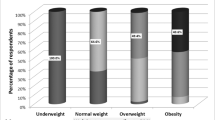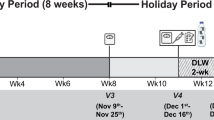Abstract
BACKGROUND: Cognitive restraint, binge eating, night eating, body image disparagement and shape overconcern describe the food and weight related attitudes of obese patients.
POSTOPERATIVE FINDINGS: At long term follow-up after biliopancreatic diversion, body weight is steadily at normal or nearly normal levels regardless of food intake: any preoccupation for food, weight and diet are thereafter completely abandoned. The normalization of body shape corresponds to a sharp improvement in eating behavior, body image and psychological conditions.
CONCLUSION: These results suggest that the dissatisfaction of one's somatic morphology and the consequent dieting account for most of the aberrant eating patterns in obese patients.
This is a preview of subscription content, access via your institution
Access options
Subscribe to this journal
Receive 12 print issues and online access
$259.00 per year
only $21.58 per issue
Buy this article
- Purchase on Springer Link
- Instant access to full article PDF
Prices may be subject to local taxes which are calculated during checkout
Similar content being viewed by others
Author information
Authors and Affiliations
Corresponding author
Rights and permissions
About this article
Cite this article
Adami, G. The influence of body weight on food and shape attitudes in severely obese patients. Int J Obes 25 (Suppl 1), S56–S59 (2001). https://doi.org/10.1038/sj.ijo.0801700
Issue Date:
DOI: https://doi.org/10.1038/sj.ijo.0801700
Keywords
This article is cited by
-
Body Perception and Satisfaction in Obese, Severely Obese, and Normal Weight Female Patients
Obesity (2010)
-
Changes in Body Image Disturbance in Morbidly Obese Patients 1 Year after Laparoscopic Adjustable Gastric Banding
Obesity Surgery (2007)
-
Attitudes of Morbidly Obese Patients to Weight Loss and Body Image following Bariatric Surgery and Body Contouring
Obesity Surgery (2007)



